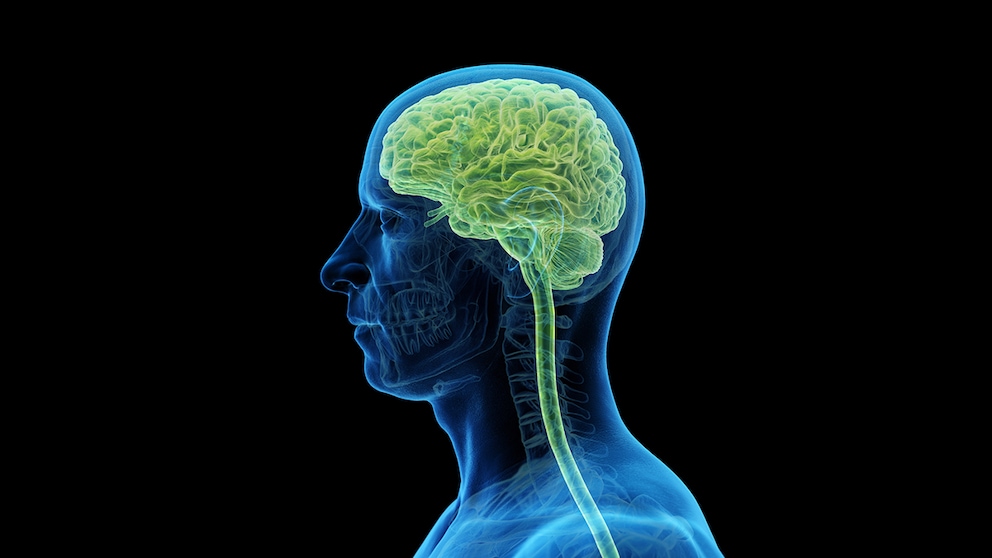November 23, 2024, 3:14 pm | Read time: 4 minutes
It is common knowledge that type 2 diabetes can have various undesirable consequences for (physical) health. However, the brains of those affected can also suffer considerable damage. A study now shows the extent of the corresponding changes, which can apparently significantly advance the decline in cognitive performance.
With increasing age, brain tissue decreases in volume. In technical terms, this process is known as brain atrophy. The gray matter in the brain – colloquially known as “gray cells” – is particularly affected, as it is an essential part of the central nervous system and is important for memory. The white matter, which is primarily responsible for communication between different regions of the brain, generally remains more stable. However, this is not the case for people with type 2 diabetes, as a recent study shows.1
Overview
Study on the influence of diabetes on the brain
The study was conducted under the direction of neuroscientists from Johns Hopkins University in the USA. Their aim was to identify possible factors that cause accelerated brain atrophy. This can lead to MCI (Mild Cognitive Impairment), a condition between normal aging and dementia.2 MCI is considered an early stage of neurodegenerative disease that can either stabilize or progress – often to Alzheimer’s or other forms of dementia.
The researchers focused specifically on the white matter of the brain. Due to its function within the nerve connections in the brain, this is no less important for cognitive abilities than the gray matter. Type 2 diabetes, which is known to affect metabolism and blood flow, can also impair the preservation of white matter and thus increase the risk of cognitive impairment. The study has now confirmed these correlations.
How the researchers conducted the study
The researchers used data from the UK Biobank for their study. In addition to treatment protocols, this included MRI images of the brains of more than 20,000 participants as well as results from cognitive tests. More than 1000 of the test subjects had a type 2 diabetes diagnosis. A particular focus of the study was on the relationship between the duration of diabetes and the loss of brain mass, looking at both gray and white matter. Biomarkers from the cerebrospinal fluid (CSF) also played an important role. In particular, the concentration of amyloid-β – a protein associated with the accumulation of plaques in the brain and Alzheimer’s disease – was examined.
The researchers then compared the results of the diabetics with those of healthy controls. They also took into account age-related changes and the influence of any medication taken.
Results
The evaluation of the study showed that subjects with type 2 diabetes lost significantly more white matter over the course of the observation period than non-diabetics. This led to a 41 percent increased risk of MCI (Mild Cognitive Impairment). The researchers saw this as supporting the findings of previous studies, which showed a link between metabolic disorders, a loss of white matter, and an increased risk of dementia.3
The analysis also found that the presence of certain biomarkers, such as amyloid-β plaques, increased the risk of cognitive impairment by 50 percent. People who both suffered from type 2 diabetes and had these biomarkers associated with Alzheimer’s were particularly at risk. Their risk increased to 55 percent.
Significance of the study
According to the researchers responsible for the study, the results clearly show how closely the changes in the volume of white matter are linked to cognitive performance in old age. The increased degradation of white matter caused by type 2 diabetes plays a decisive role in cognitive decline. This is the first study to demonstrate the interaction between type 2 diabetes and amyloid plaques. It illustrates that the combination of both factors damages the white matter in the brain more than either of them alone. Finally, the authors emphasize how important it is to identify people with accelerated brain atrophy at an early stage. This is the only way to improve current strategies for preventing and slowing down the progression of MCI.

Personality Types 3 Psychological Profiles That Determine Your Risk of Dementia According to a Study

According to the study What your sleeping position reveals about your risk of Alzheimer’s disease

According to Studies Just One Alcoholic Drink a Day Can Cause the Brain to Shrink
Previous study on diabetes and brain changes
A study published in 2022 also showed that type 2 diabetes causes the brain to age faster.4 At that time, the focus was on the gray matter of the brain. The researchers found that the shrinkage of tissue in the ventral striatum, cerebellum, and putamen, for example, progressed 26 percent faster in advanced diabetics than in healthy people. As a result, neurodegenerative changes also set in earlier.
At the time, the researchers cited the impaired glucose metabolism in the brain due to type 2 diabetes as a possible reason for this. The resulting lack of energy could damage the structure of the brain and therefore limit its function.

